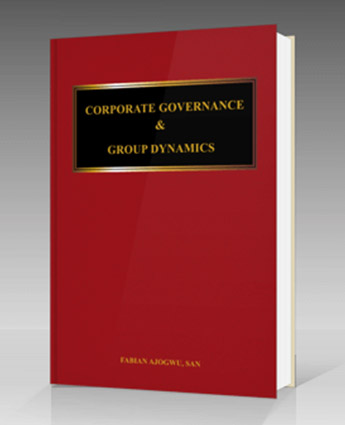I am pleased to be asked to write the foreword to Dr. Fabian Ajogwu’s book, Corporate Governance & Group Dynamics.
It is generally agreed that the leadership provided by the board will always be a significant factor in the successful running of the enterprise. For many years, the discussion has focused mainly on the need for the corporate to be governed by an efficient Board, and the emphasis has been on adhering to the principles of corporate governance especially in relation to globally accepted best practice. However, it is becoming increasingly clear that some attention should be given to the more complex relationships that exist between companies operating within a group structure, for the simple reason that the actions of the parents often affect the subsidiary and vice versa. This book, turning the searchlight on this complex area of company administration, is indeed a welcome addition to the literature on corporate governance and enterprise development, especially because it raises questions about the suitability of existing models of corporate governance in Nigeria for dealing with the complexities of group structures, particularly in the banking and financial services sector.
The Author makes the point clearly that ‘corporate governance within groups is better observed when the respective boards of the parents as well as the subsidiaries are accountable to their respective shareholders and stakeholders, and take responsibility for the direction of the specific enterprise that they are by law responsible for’. He believes that it is precisely the lack of this accountability and responsibility that led to the corporate maladministration and failures of recent times. The Author goes further to recommend that ‘it is specific responsibility of each board that could ensure proper disclosures, integrity in financial reporting and a duty of accountability of management to the shareholders’. I cannot agree more.
Dr. Fabian Ajogwu, SAN has been a great advocate of good corporate governance practice in Nigeria since it became a discipline of interest to practitioners in the country. He has taught it, preached it and written on it consistently, bringing his understanding and expertise on the subject to bear on his interactions with his audiences over the years. For me, this book offers additional confirmation of his scholarly commitment, which is evident in the scope and depth of discussions, the propositions as well as the analysis of the principles of corporate governance as they apply to groups. I must commend the Learned Senior Advocate for making this significant contribution to the jurisprudence of corporate governance. I therefore have no hesitation in recommending this book as an authoritative text on the subject for the benefit of companies, boards, shareholders, regulators, directors, managers, stakeholders and indeed all who are interested in seeing that our corporations become increasingly well governed.
Dr Christopher Kolade, CON Pro-Chancellor, Pan-Atlantic University Formerly,
Nigerian High Commissioner to the United Kingdom Formerly,
President, Society for Corporate Governance Nigeria Lagos.
June 2013


